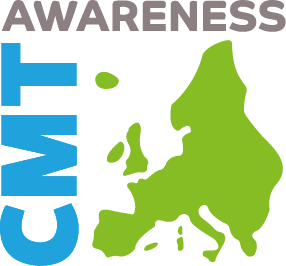Press release
Charcot Marie Tooth Awareness Campaign in the Month of October
The European CMT Federation (or ECMTF) is launching its fifth campaign to raise awareness of Charcot-Marie-Tooth disease, the most common of the rare diseases. It will run in 10 European countries in October 2021 and aims to raise awareness of the pathologies and symptoms among the general public and health professionals. The campaign aims to improve screening and reduce the number of diagnostic errors in order to get the best possible treatment as early as possible …
A rare disease … and yet common
Charcot-Marie-Tooth disease (CMT), named after the three doctors who first described it, is a rare and little-known neuropathy.
The number of people affected in Europe is estimated at around 300,000, making CMT the most common rare disease!
CMT is a genetic disorder that affects the peripheral nerves that connect the spinal cord to the muscles and sensory organs and transmit messages from the brain to the limbs. These signals affect motor skills, which affect movement, and sensory skills, which affect the sense of touch or pain. The combination of these messages also helps maintain balance.
A disease that is «unknown and ignored».
The disease develops slowly and has many effects: progressive deformation of the feet and hands (fallen arches, clawed toes, muscle atrophy in the calves, forearms and hands), balance disorders, sensitivity disorders, fatigue, pain, cramps, etc. and the quality of life of Charcot-Marie-Tooth sufferers deteriorates.
CMT is often referred to as the «invisible disability» because the difficulties are usually not readily apparent or are underestimated. The number and severity of symptoms vary greatly from patient to patient. Understanding CMT is therefore more difficult for relatives and friends, as well as for healthcare professionals involved in the diagnosis.
A communication campaign to make Charcot-Marie-Tooth disease known and recognised
The 5th campaign of the European CMT Federation starts on 1 October in 10 European countries: the UK, France, Belgium, the Netherlands, Italy, Spain, Germany, Austria, Romania and Israel. The campaign’s powerful visuals will help raise awareness of Charcot-Marie-Tooth disease. 7 webinars in 7 languages and 6 patient/doctor videos will be created to explain CMT disease and talk about diagnosis and living with CMT. A digital social media campaign (Facebook, LinkedIn, Instagram) targeting healthcare professionals will be conducted in each participating country.
The cmt-awareness.com blog will bring together all the awareness-raising and communication tools.
The European CMT Federation, the organiser of the campaign
The ECMTF is a consortium of 15 patients’ associations (10 Full Members and 5 Associate Members) set up in August 2018 and represents about 1/3 of people suffering from Charcot- Marie-Tooth disease in Europe, about 100,000 patients. The ECMTF is a member of EURORDIS, EFNA, and TREAT-NMD.
The main objectives for CMT Europe are:
– Making the general public throughout Europe more aware of CMT
– Promoting and supporting collaborative research.
More about CMT :
A family disease, a family of diseases
Charcot-Marie-Tooth disease is hereditary and rarely occurs by chance. There are different types of pathology as several genes may be involved. CMT symptoms occur when a peripheral nerve is affected and the speed of the nerve impulses slows down. The damage can affect both the axon that transmits the nerve impulse and the myelin sheath that covers it for protection, or even both at the same time.
No cure, but research is making progress
There is no cure for CMT. Patients can improve their quality of life through a multidisciplinary approach: Use of assistive devices (orthoses, foot supports, etc.), physiotherapy and self-rehabilitation, adapted physical activity, psychological support, technical assistance, alternative medicine (acupuncture, sophrology, etc.).
A drug candidate called PXT3003 is being developed by Pharnext, a biotech company based in France, for the treatment of CMT1A, the most common form of CMT. PXT3003 is the most advanced therapy being developed as part of an international phase 3 clinical trial, the PREMIER trial (more information can be found here). PXT3003 has previously been tested in a Phase 2 and a Phase 3 trial, which have shown encouraging efficacy data and a good safety profile in patients with mild to moderate CMT1A.
It is also important to note that InFlectis BioScience will soon begin Phase 2 development of a treatment for CMT.
Several other biotech companies and academic laboratories are also currently working on CMT RNA or gene therapy strategies.







